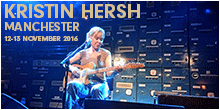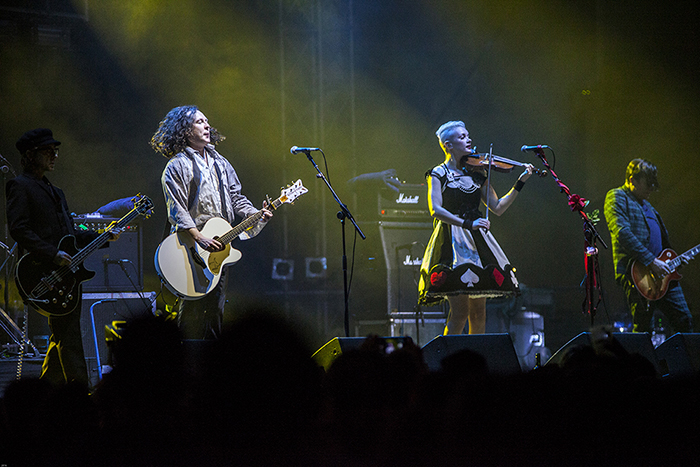
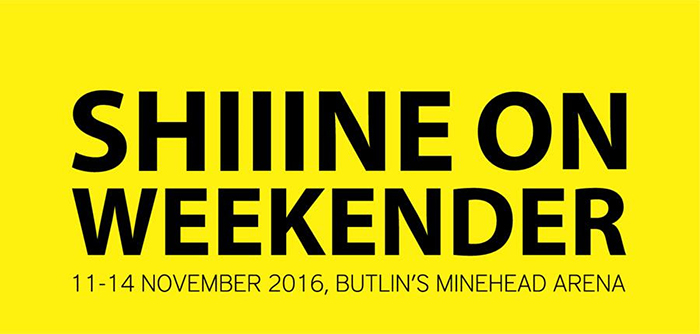
Of the three important music weekenders Butlins arrange in the year, Shiiine On in Minehead has emerged as the most popular, possibly due to its more sweeping focus and the encompassing of bands on the more conventional side of the indie spectrum. If Rockaway Beach embraces more esoteric sounds, Shiiine On is a time to come together, and celebrate. Jacqueline Howell and Dave MacIntyre tell the story, Dave takes the photographs...
Thanks to the relaxed timetable of West Country trains on a Friday afternoon, we arrive late at the second annual Shiiine On Weekender, a new festival that began as a celebration of late '80s and early '90s indie and dance music but has since grown into a brewing resurgence of music and culture. Coming from Canada, we quickly realise we should have left an extra day to get here so as to be refreshed and ready to marathon it, as well as to ensure we see some early Friday bands of interest. Travellers' mistake. We’ll regret it and feel it all weekend.
Minehead is a lovely beachfront town that has a perpetual breeze rising from the Channel and a natural landscape that fronts all of this musical tourism. A nice contrast, and a bracing seaside walk is welcomed as we begin and end each day of music immersion. We are staying at a nearby hotel rather than onsite. Inside Butlins it’s a different climate, steamy and humid, full of people and full of chatter in different regional accents, the air perfumed by lager. Home.
We must rely on other reports for the early part of Friday and we miss some bands we had planned to see, including The Black Jackals, Cellar Doors (in from San Francisco), The Train Set, Space Monkeys (who we caught last year) as well as the return of The House of Love.
We plunge into the crest of Friday night’s main event as returning act The Wonder Stuff take to the stage. They come out of the gate with a terrific high energy set, saying they are happy to be back, and this crowd is happy to receive them. The Stuffies are as solid as ever and it is a treat to see them at the dawn of the weekend; they were the main stage closers the previous year. Further, we are happy not to be seen crying during 'Size of a Cow' again in a fit of end-of-great-weekend teariness because these could be the best days of our lives! We will later meet someone who found this festival while searching for gigs by this, her favourite band. The rest of Shiiine’s offerings and culture tumbled forth, and she and her partner, utter veterans of both widely known and hidden gem UK festivals, are now integral members of a loose, wide family here. Through a deep online search for her Stuffies fix, they’ve now become key members of the scene, documentarians quietly known by most here, and, incidentally, to our great discovery, new friends.

Next, Echo and the Bunnymen take us into the depths with their entirely different groove, Ian McCulloch’s voice as clear and deep as ever. 'Lips Like Sugar' is still sexy as hell, dark and lovely. They’ve been back out on the road for some years and we’ve had occasion to see them at Toronto’s crowd pleasing shows, our home city being a stronghold of music like this. Toronto was at its apex in the mid '80s, vibrant and utterly cool, our Queen Street West a grungy informal village of black trenchcoats and pointed toed boots, the kind you can’t get anymore. It was a good land when voices like McCulloch’s rang out from PAs and car stereos and shops. This band has had a post-2000s boost from the cult movie Donnie Darko, a film that pulls off the unlikely feat of feeling true to 1988 as much or more than anything of that era. It helped awaken something.
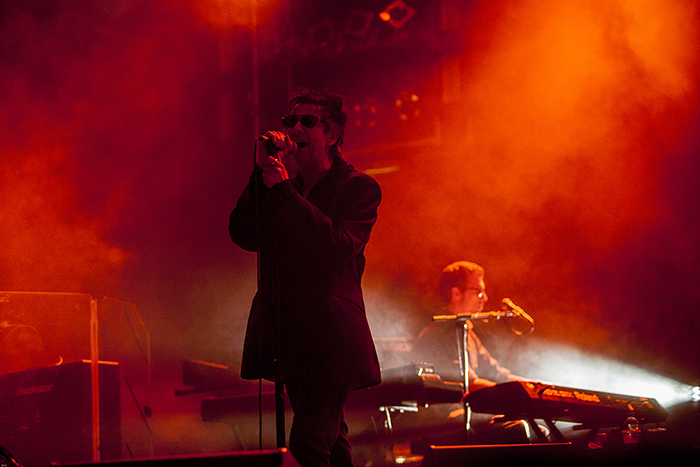
The Bunnymen's closing show on Friday is a good point to remind Shiiine goers that the audio experience results vary in different spots of the massive tent that forms the main area of Butlins Minehead. Unlike at Butlins’ smaller festivals, where the perfect Centre Stage room is utilised as the main stage, the Skyline stage here is a temporary structure (such as you would have at an outdoor festival). Having read one book on The Hacienda, we’ve become self-described experts on the challenges of audio in cavernous spaces – “baffles”, “absorption” – but as ever, if you do what’s right and go to the barrier or into the crowd (which is uncommonly friendly and gentle, even among strangers hoisting full pitchers of beer,) you’ll get what you have come for, the proper sound and stage views. For the lurkers at the back, there’s echo of a different kind and state of the art screens for you. There’s also, bizarrely, beach chairs that are in full use all weekend long.
Musical artists roam and mix freely with audiences in massive after-parties that make up the second festival once the main stage ends at 10pm. The barriers become as thin as a membrane, and you may well find yourself chatting with one of your favourite musicians at the long, long lines that form at the ample bars. Centre Stage and Reds go dark, and alive, and everyone comes together, flooding in to perfect rooms that return us to the '80s and '90s we crave and miss most of all: the camaraderie of youthful timelessness that extends way past your table of friends, bound only by a flyer, a happy face, a t-shirt, a search, for our kind, in the faces of big, anonymous cities where our music was never so popular that it become uncool. If it never became uncool it is still intact. Something the British press has never understood or cared to acknowledge.
This festival, and this venue, creates an indoor afterparty that is very different to the summer festivals of endless walking, sometimes mudding, constant standing, and random collapses on to bare spots on the high ground. Here, there are two different rooms, each a well-run nightclub, each with a massive dance floor and large seating areas with views. You can be tired from travel or work, or you can be the sort who doesn’t dance or want to stand on a dancefloor with a drink, and be at home. There is room. There are tables and chairs and places for large groups and singles to feel OK in. It all goes pitch dark eventually aside from the strobes onstage. You may lose the friends you plan to meet up with, but you are just as likely to find new ones. Security is present but will leave you utterly alone to enjoy yourself (and is always up for a friendly chat); the only intervention we see is when a punter decides to dance on tables or chairs. That’s the only rule. And as we learned this as toddlers it presents no problem.
It must be mentioned that here in Centre Stage, the centre of all life after 10pm, the room is flanked on either end with 40 foot long bars serving everything you might want. And for peak nights like this one, there are additional beer stalls set up beside the bars. The patrons drink like it’s an all-inclusive resort, here to party like any vacation, in our happy vacation mode, without the bother of weather, sunblock or excursions. You may lose your companion for an entire hour, but you will still have conversations in passing as people wait cheerfully for ages for their fix. You can see why pitchers are preferred and not at all excessive (to dance with?)
The acclaimed later night sets across the weekend will include Deja Vega, The Frank and Walters, Psyence, Audioweb, and Smoove & Turrell. These rooms are also the home of terrific long nights of legendary and younger DJs and top cover bands such as the brilliantly named Sex Pissed Dolls (who are terrific musicians and take on not only Sex Pistols but Ramones, Clash, and Blondie material with ease), The Clone Roses and The Smyths. The main comment throughout is that The Clone Roses are too good (and they are a revelation) and both the Roses and The Smyths give Friday night crowds a quality, uncut fix of so much great music that was far too short lived in the real world. In all these ways, Shiiine delivers well past the headliners with entire evenings that keep the vampire crowd entertained until 4am.
Shiiine’s headliners by and large deliver as promised and each offer something different but compatible to this weekend. The consensus is strongly favourable for Ash, Cast, Shed Seven and The Bluetones, with even the odd unplanned stage departures of singers in other main stage bands somewhat befitting the reputations of the artists who left their assigned spots. That’s Entertainment.
We turn the rest of our reporting to the biggest standouts and utter high points of the weekend for us.
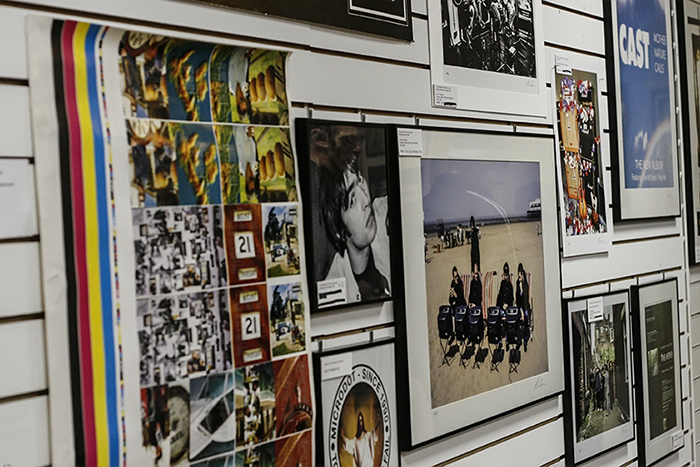
Saturday Standouts
After seeing their stunner of a gig at Shiiine On 2015, the return of Thousand Yard Stare is highly anticipated. That first performance instantly secured a place on our top-10 list of concerts for 2015, and tonight they reach the same heights. Stephen Barnes and the lads threaten to blow the roof apart, firing off a relentless slew of guitar-driven indie rock that quickly draws in spectators and packs Centre Stage on Saturday night. Throughout the set, Barnes prowls the stage like a caged panther pointing at fans, stretching time and making it his plaything as he decides to eat an apple mid set, winning over anyone here to see other bands or DJs one by one, gaze by gaze. And wins. We are treated to massive sounding versions of 'Keepsake', 'Version of Me', personal favourite 'Comeuppance', and 'Wonderment' before the band leaves the stage with fans screaming for more. Tonight’s show marks the end of a string of UK shows on their first tour in twenty-three years. We can only hope that Thousand Yard Stare will continue with more dates and new music. And we’ve seen that they can handle any room, any crowd, any sized mass and any spot on the line-up and were always destined for greatness. They still must be seen.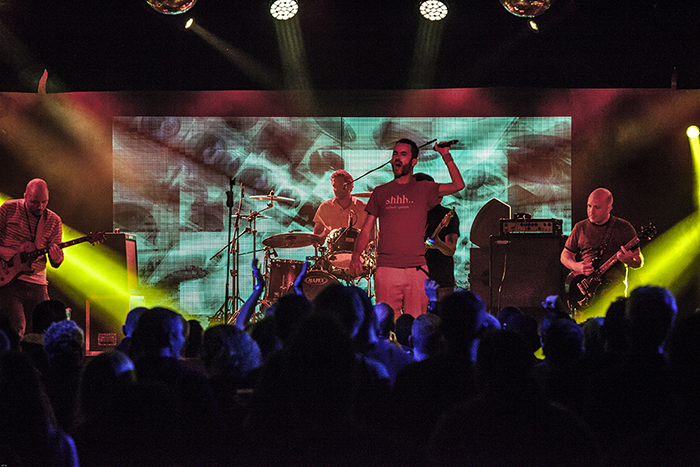
Cud are simply riveting. Back from last year, the mid-80s Leeds foursome have recently come out of hiatus, touring with the also reformed Ned’s Atomic Dustbin. Cud are somewhat different to most of the bands out there working today. There’s the rare and beautiful throwback punk feeling of slight danger about Carl Puttnam, who postures and uses the space in a way most singers today never do; not preening for cameras but communicating with an invisible god/demon/muse. Like Thousand Yard Stare who play before them, this band swell in Centre Stage with its perfect light, sound and walls, and shine brightly. Both had taken on early slots on the Skyline stage last year before headliners, at challenging times in the early evening, and delivered. Tonight they get the best of the crowd’s attention and are better featured, leading to wonderful results. We watch people make discoveries of this music, and fall in love. It’s really something.
A long, long night of talk follows. The best talk, where you can only hear five inches in front of you but you pass on the best bits from ear to inclined ear around the group. Music talk, talk of other gigs and festivals, future plans and remember whens, and these are people we’ve just met from another country. Because the remember whens are shared currency that are stronger than the temporal world, and thrive among those still in touch with its rhythms. Photos and films are taken, some locked away like Gollum would, others to be shared with the world. All the while live music beats on, DJs come and go, and no one in our company even threatens to leave before doors.
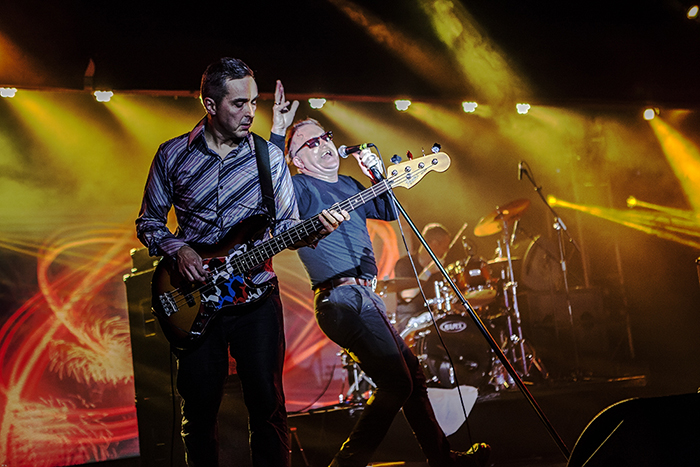
Sunday Standouts
Adding Echobelly to this year’s line up was both utterly logical – they had nine charting singles between 1993 and 1997 – and very welcome, as across most festival bills, no matter how diverse, female-led rock bands (both returning and emerging) are rather thin on the ground, though the return of Echobelly, Lush and Belly this year is encouraging. The early '90s were far different and better than today’s music industry: women were a big part of the scene and very much held their own alongside some very big talents, egos and personalities of the boys of Britpop who hogged a fair number of magazine covers.
Echobelly’s new line up is greeted by the Shiiine On crowd with enthusiasm. Sonya Madan’s voice is still lovely, and the new line up sounds strong. It cannot go unremarked how unchanged Madan is. She looked sixteen in 1993 and could pass for mid-twenties today. It’s just another uncanny detail that helps along the buzz of the crowd on this Saturday, midway through a festival, the sweet spot. Echobelly are back, with new music and glorious memories both. It’s a strong performance, one of those marvellous hours where the loved-up feeling between band, singer and crowd is actually visible, the energy palpable, the promise as real as it was back in the halcyon '90s. The hit 'Great Things' is sung by the entire room, giving it the air of a football chant, as Madan presides above the crowd, clearly enjoying it all.
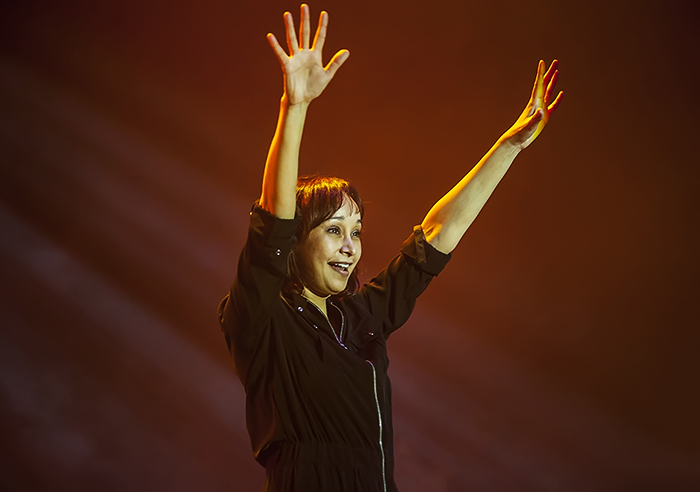
Here is what The Farm did in just about an hour on Remembrance Sunday under a big top in Butlins: per Charlie, they gave a “performance showing respect to those who lost lives in war; about wishing for more love in the world and about stamping out racism. Genuine people. True people who use music to show passion.”
And that’s exactly right. The set list for an established band can go in many directions, considerations among them are fan service, time allotted, and band preference (possibly in that order). But in just an hour that flies by, The Farm manage to meaningfully address the events of our distant past (that we must never forget), state their own thoughtful, sensitive anti-war messages still very much needed in the world, launch a new song (seamlessly) called 'Feel The Love' that reminds us all why the '90s optimism is no less urgent today, and they make a clear call against the vile disease of racism, that is today front page news in our leading nations. War, love over hate and racism; the things endlessly trouble politics and nations and have come screeching out of the long shadow of Brexit and the Reality TV horror show of the shocking US Presidential election.The need for musicians as troubadours, firmly and ethically outside of corrupted systems, is as urgent as it has ever been.
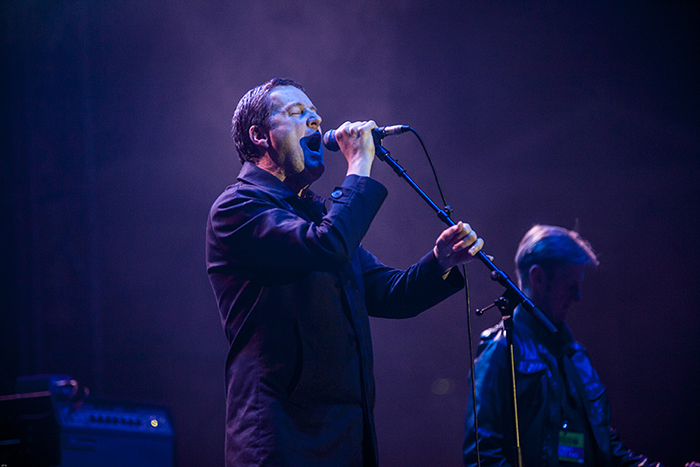
There are key elements of this festival that have made it an instant tradition for those who gravitate towards it. The Farm, like other notables, are back for a second year, again with their cover of The Clash’s 'Bankrobber', the emblemic song of The Justice Collective’s efforts on behalf of the decades long fight for Justice for the 86 (Hillsborough). Last year’s version came with the message of a continuing campaign up and down the UK. Today, the song is played in a sense of celebration as the cause has at long last turned a corner with the latest inquest in early 2016, for the first time, laying responsiblity for the senseless overcrowding deaths in 1989 at the feet of the police instead of Liverpool fans who were smeared by officials and the media. The Shiiine audience gets a very rare feeling today that we are catching up with friends and their good news rather than just seeing another gig. It takes a lot of heart and skill to make it look this easy and sound this smooth. And so, the weekend is quickly steeped in tradition, if none quite so poignant as this.
Bands that have been quiet for a decade are back with regularity this year. They are here. There’s a currency like we’ve only read about from moments of sea change and music revolution. It is invented out of credibility, trust, and maybe even fate. What is there in the current musical landscape to inspire culture shifts anymore? That is not made from compressed files, from compressed hearts and lives? What is more permanent, more interesting than this recent history? Who needs reminding, inspiration, a reset? Who wants to start a band? No, a band, with instruments, with grit, with songs, with guts? The journey is important, down to Minehead, train delays be damned, and the journey back to all the promise of this musical period. And there’s a reality, an immediacy, to the whole thing that makes phones onsite a necessary evil to be put away when we find each other. Or when the battery dies. In that one way, and that way only, Shiiine On Weekender is retro.
How strange, how wonderful, how of the '80s and early '90s the feeling of this weekend is. For us, that was age 16 to 26. Hard and wonderful years, growing pains, the days in which we met. But this is not nostalgia, rather a grasp of the tail of something all these bands and visionaries were inventing and we were experiencing and defining ourselves by, in all our relative youths, then. It’s still needed. It bloomed but was soon extinguished (like a fad, only it wasn’t), cruelly killed by shallow media agendas, boy bands and the aggression of jutting hipbones and belly tops, quite premeditated, too, because gender equality and musical diversity had been happening for a decade for the first time in history before our cultural Y2K disaster. There was in the '90s such hope for the future. We thought it was a continuum, and that progress could only march forward. We hadn’t had enough life under our belts to experience true disaster. The achievement of our era of music, that curiousity, youthful daring and hope, and these feelings, that’s all we’re celebrating here. All who remain, who can sing, who can attend, who can witness, who can report. And in celebration there is sometimes new life.
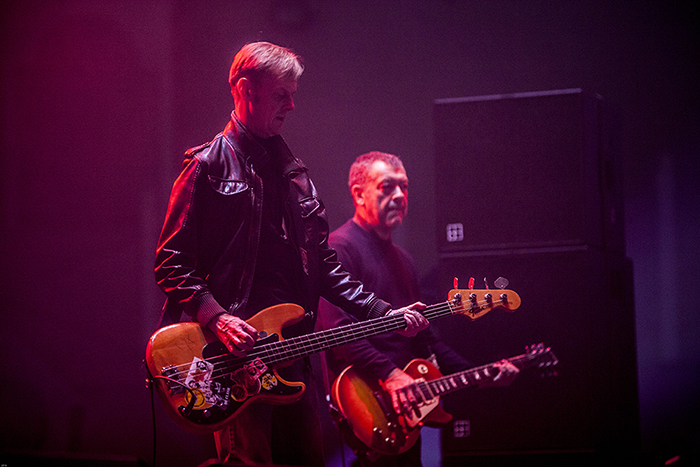
Jacqueline Howell and Dave McIntyre are co-founders of Toronto-based Disarm Magazine (formerly known as Step On Magazine). Kindred spirits in the alternative music field ... 100% independent ... 100% vital.
